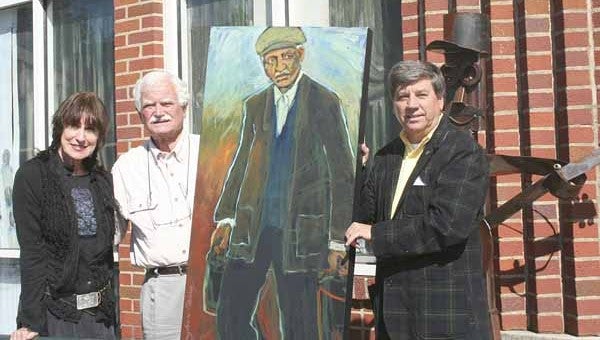Artist donates painting to Brundidge Historical Society
Published 11:00 pm Wednesday, October 24, 2012

Artist Mary Ann Casey donated a portrait of George Washington Carver to the Brundidge Historical Society on Wednesday. Carver was the Father of the Peanut and the historical society sponsors the annual Peanut Butter Festival that pays tribute to the little nut. Pictured from left, Casey, Lawrence Bowden, BHS president, and Brundidge Mayor Jimmy Ramage.
Troy artist Mary Ann Casey has always had great admiration for George Washington Carver, the Father of the Peanut.
Casey said that although she admires and appreciates the work that Carver did in finding about 300 uses for the peanut, it is Carver’s character that most impressed and inspired her.
“George Washington Carver gave so much to others and asked for so little,” she said. “He has been called the American Gandi. He was committed to doing for others. His legacy is peace and caring. He is one of the people that I admire most.”
When Casey was working on her “Alabama Icons and their Stories” exhibition, she researched each individual. Although she was impressed by each one, there was something about Carver that was special.
“It was his spirit,” she said. “He could have left that tiny lab at Tuskegee Institute where he worked and probably become a rich man but money didn’t mean anything to him. It was what he could do for mankind that mattered most.”
Carver developed alternative crops to cotton including peanuts, soybeans and sweet potatoes. He is credited for helping save the South. Early in the 20th century, the boll weevil wiped out the cotton crop and Carver encouraged farmers to plant peanuts as an alternative crop.
Casey said the story of Carver and his dedication to research, which was aimed at helping poor farmers grow alternative crops as a food source and as a source of other products to improve their quality of life, inspired her to include his portrait in the Alabama Icons exhibition.
On Wednesday afternoon, Casey donated that portrait of Carver to the Brundidge Historical Society to hang in the We Piddle Around Theater in downtown Brundidge.
“The historical society sponsors the Peanut Butter Festival, which pays tribute to the peanut,” Casey said. “George Washington Carver did so much research with peanuts and found so many uses for them so I thought it would be appropriate for the portrait to hang in the town that honors the peanut.”
Casey said it is her hope that the portrait will motivate others to learn more about Carver and the role he played in agriculture in the South.
“George Washington Carver provided a character development list for his students,” Casey said. “That list included being clean inside and out, losing, if need be, without squealing and always being considerate of women, children and older people. He also said that you should not reach up to the rich or down to the poor. You should be too brave to lie and too generous to cheat. That’s a great list to live by.”
Casey said Carver has inspired her to live by the list and be more in harmony with giving, with others and the hereafter.
It is her hope that others will be inspired by the portrait of Carver, an Alabama icon, and do as he said, “Take your share of the world and let others take theirs.”




